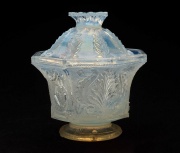Difference between revisions of "Opal glass"
Jump to navigation
Jump to search
(username removed) |
|||
| (5 intermediate revisions by 3 users not shown) | |||
| Line 1: | Line 1: | ||
| − | [[File:1979.669-SC41868.jpg|thumb|]] | + | [[File:1979.669-SC41868.jpg|thumb|Sugar bowl<br>1979.669A-B]] |
== Description == | == Description == | ||
| − | A milky white, translucent [ | + | A milky white, translucent [[glass|glass]]. Opal, or opalescent, glass was first made in the mid-1800s but not patented until 1880 by Louis Tiffany. Tiffany and J. La Farge prepared large sheets of opal glass for use in windows. Opal glass is made white by the addition of [[calcium%20phosphate|calcium phosphate]] (bone ash) and opalescent by the addition of fluorides ([[fluorspar|fluorspar]], [[cryolite|cryolite]], or [[lepidolite|lepidolite]]) and/or [[arsenic|arsenic]]. Opal glass was used for light shades, table tops, and cosmetic jars. |
== Synonyms and Related Terms == | == Synonyms and Related Terms == | ||
| Line 8: | Line 8: | ||
opalescent glass; white glass; vidrio opal (Esp.); opalina (Esp.); opaline (Fr.); opaalglas (Ned.); vidro opala (Port.); bone glass; flint glass; alabaster; opaline; Vitrolite | opalescent glass; white glass; vidrio opal (Esp.); opalina (Esp.); opaline (Fr.); opaalglas (Ned.); vidro opala (Port.); bone glass; flint glass; alabaster; opaline; Vitrolite | ||
| − | == | + | == Resources and Citations == |
| − | J.Sloan, "American Opalescent Window Glass: Composition and Deterioration Issues" in ICOM Preprints, Lyon, 1999. p.803-808. | + | * J.Sloan, "American Opalescent Window Glass: Composition and Deterioration Issues" in ICOM Preprints, Lyon, 1999. p.803-808. |
| − | + | * G.S.Brady, ''Materials Handbook'', McGraw-Hill Book Co., New York, 1971 Comment: p. 365 | |
| − | * | + | * Susan E. Schur, Conservation Terminology: A review of Past & Current Nomenclature of Materials, ''Technology and Conservation'', Spring (p.34-39); Summer (p.35-38); Fall (p.25-36), 1985 |
| − | |||
| − | |||
* ''Dictionary of Building Preservation'', Ward Bucher, ed., John Wiley & Sons, Inc., New York City, 1996 | * ''Dictionary of Building Preservation'', Ward Bucher, ed., John Wiley & Sons, Inc., New York City, 1996 | ||
Latest revision as of 17:23, 25 August 2020
Description
A milky white, translucent Glass. Opal, or opalescent, glass was first made in the mid-1800s but not patented until 1880 by Louis Tiffany. Tiffany and J. La Farge prepared large sheets of opal glass for use in windows. Opal glass is made white by the addition of Calcium phosphate (bone ash) and opalescent by the addition of fluorides (Fluorspar, Cryolite, or Lepidolite) and/or Arsenic. Opal glass was used for light shades, table tops, and cosmetic jars.
Synonyms and Related Terms
opalescent glass; white glass; vidrio opal (Esp.); opalina (Esp.); opaline (Fr.); opaalglas (Ned.); vidro opala (Port.); bone glass; flint glass; alabaster; opaline; Vitrolite
Resources and Citations
- J.Sloan, "American Opalescent Window Glass: Composition and Deterioration Issues" in ICOM Preprints, Lyon, 1999. p.803-808.
- G.S.Brady, Materials Handbook, McGraw-Hill Book Co., New York, 1971 Comment: p. 365
- Susan E. Schur, Conservation Terminology: A review of Past & Current Nomenclature of Materials, Technology and Conservation, Spring (p.34-39); Summer (p.35-38); Fall (p.25-36), 1985
- Dictionary of Building Preservation, Ward Bucher, ed., John Wiley & Sons, Inc., New York City, 1996
